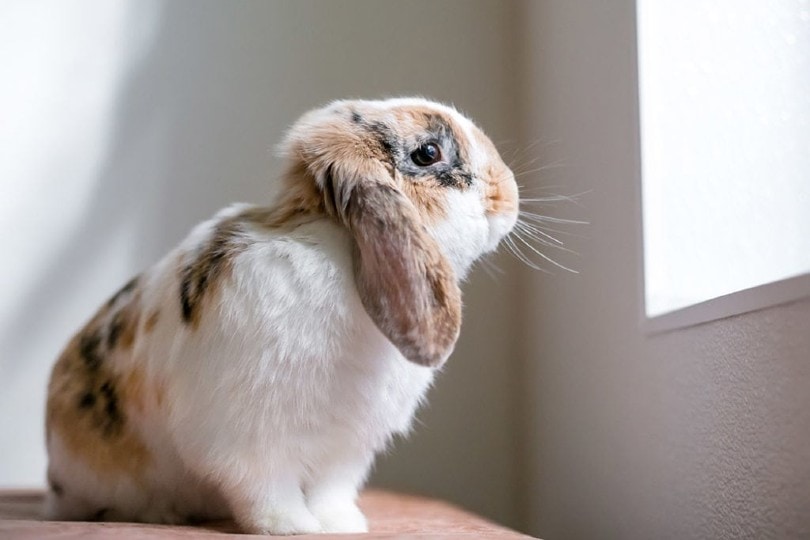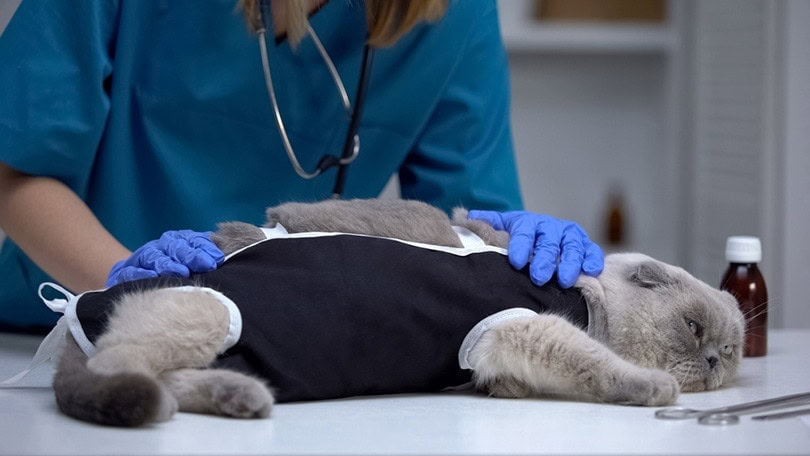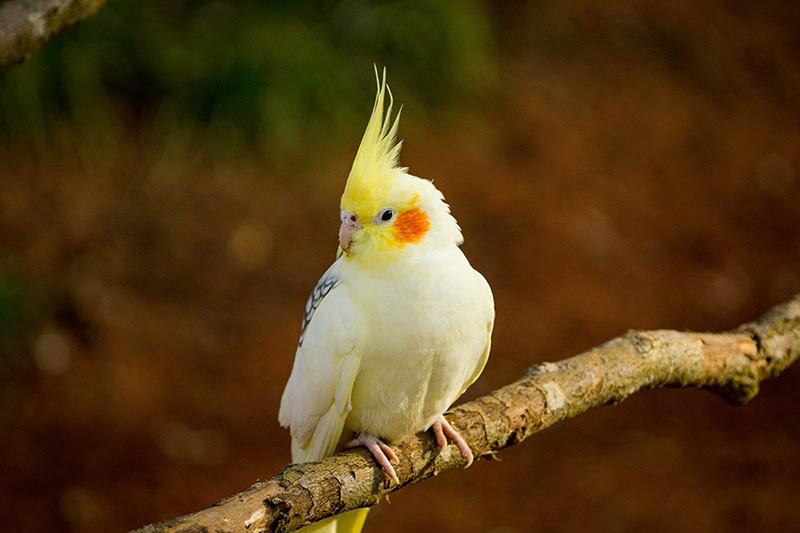VET APPROVED

The information is current and up-to-date in accordance with the latest veterinarian research.
Learn more »Rabbits in a safe and familiar environment love to explore and express themselves in various ways. However, they’re more sensitive to environmental pressures and predator stress, being a prey species. You may think that rabbits, similarly to humans, can also become sad or depressed.
However, it’s not always that simple, and changes in a rabbit’s behavior should not be anthropomorphized, as an underlying illness may be overlooked. Oftentimes, when we look at our rabbits and feel they are sad or depressed, they may actually be ill or in pain and require veterinary attention. They can also feel frightened or stressed due to a sudden stressor we may not be aware of. Fortunately, we’ll discuss several signs you can look for that indicate health issues, fear, or stress in rabbits, which can be easily mistaken for depression or sadness.

The 10 Signs Your Rabbit Is Not Feeling Well Or Is Stressed
Disclaimer: Please note that a rabbit’s health can deteriorate rapidly and lead to life-threatening complications. If you notice your rabbit not eating as much or at all, producing less feces, having diarrhea, being lethargic or reluctant to move, or having a painful or bloated abdomen, seek urgent veterinary care.
1. Lack of Appetite
Rabbits love to eat, and they need to eat consistently. They can be seen eating hay regularly throughout the day and never seem to turn down the treats their human companions offer them. However, when a rabbit becomes unwell for any reason, they may shy away from snacks and eat less of their food during mealtimes. They might only nibble on food or stop eating altogether, both of which are serious red flags and require urgent veterinary attention.
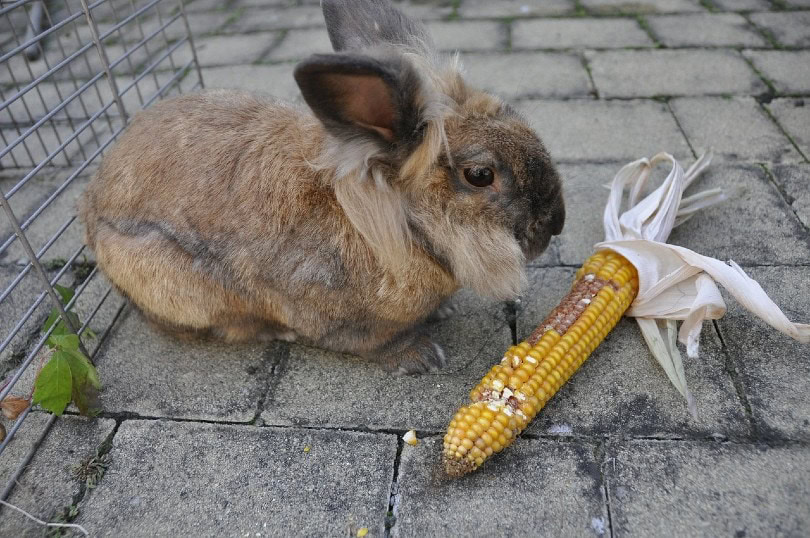
2. Frequent Pacing
Pacing around their habitat occasionally can mean that your rabbit is bored and needs new toys to chew on or should be let out of the habitat to stretch their legs and exercise. However, if your rabbit is pacing back and forth, whether in the habitat or out, there is a good chance that they are feeling stressed, bored or frustrated. An excellent way to tell is to provide more interaction and entertainment to your rabbit to see if the pacing stops.
3. Tendency to Hide
Another sign of fear, stress, and illness may be a tendency to hide, especially for rabbits that are not usually shy. A rabbit might run and hide when a stranger visits the house or the dog barks for some reason, which is normal due to being startled or afraid. However, if your rabbit is hiding away in a den or corner for a few hours at a time, there is likely an underlying health reason that requires prompt veterinary attention. Sick rabbits may hide in dark places where other rabbits and people cannot easily reach them.
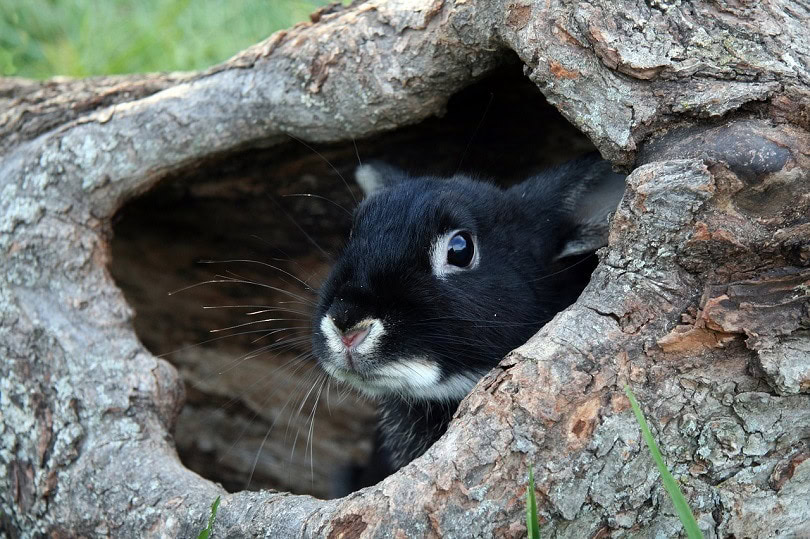
4. Onset of Biting
Rabbits chew on things all day long to keep their ever-growing teeth from getting out of control. If wooden toys and other interactive objects are available to chew on, as well as plenty of hay and grass, they should do so happily during the day. However, if your rabbit starts biting their cage, their food or water dish, or people, they could be displaying a health issue, stress, boredom, or frustration.
5. Grooming Habits
This is a subtle sign that can be hard to spot if you do not keep a close eye on your rabbit’s regular habits because grooming is something that rabbits spend a great deal of time doing. If a rabbit becomes unwell in any way, they might spend too much of their time grooming themselves even when the practice is unnecessary, or way too little. If you notice that your rabbit is grooming more often than usual, especially if it’s resulting in bald patches, seek veterinary attention, as it may indicate the presence of skin parasites as well as other skin health conditions. Reduced grooming leading to matting may occur in elderly rabbits who are in too much pain to reach certain spots, or obese rabbits.
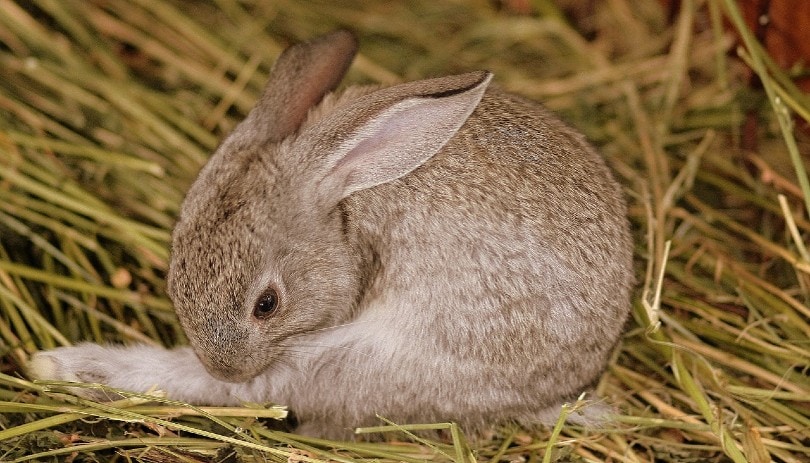
6. Obvious Lethargy
Lethargy seems to be a universal sign attributed to depression in people, but in rabbits it usually signals a serious underlying health issue. Illness, regardless of the body system affected, often results in a lack of activity overall, so losing the desire or need to play, run around, and explore, often combined with lack of appetite and reluctance to move. If you start to notice that your rabbit is lacking interest in their normal activities, it’s time for an urgent vet visit.
7. Difference in Posture
Bunny rabbits that are scared, ill or in pain may take on a “hunching” posture that makes them look uncomfortable. A pained or injured rabbit, depending on the injury, may not easily lie down and relax. Instead, they may sit up with their backs hunched and their eyes slightly closed, ignoring what is happening around them. Their ears may droop, and they will not move much unless urged to do so or the need arises. Please seek veterinary attention immediately if this is how your rabbit is behaving.
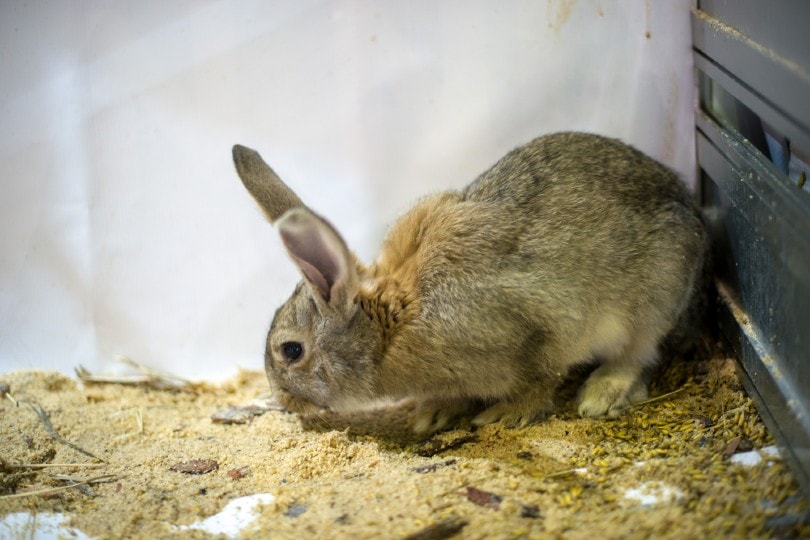
8. Being Antisocial
A scared, sick or painful rabbit does not feel like being social, even with their favorite human companions. An antisocial attitude for more than a few hours often indicates illness. However, if your rabbit gets antisocial only very occasionally or for a brief time period, this may be due to fear, stress, a change in their environment or a separation from a rabbit companion.
9. Change in Poop
If a rabbit becomes lethargic and stops eating or drinking enough, their stools may become smaller, drier, and less abundant than usual. A rabbit’s poop should be about the size of a pea. However, sick rabbits that are not eating or drinking properly generally produce less feces, or feces of abnormal size or shape. The pellets may look dry and may crack apart when moved, stepped on, or cleaned up, or may be very moist or even loose. Any change in your rabbit’s defecation habits, fecal output, and texture requires a prompt veterinary visit without delay.
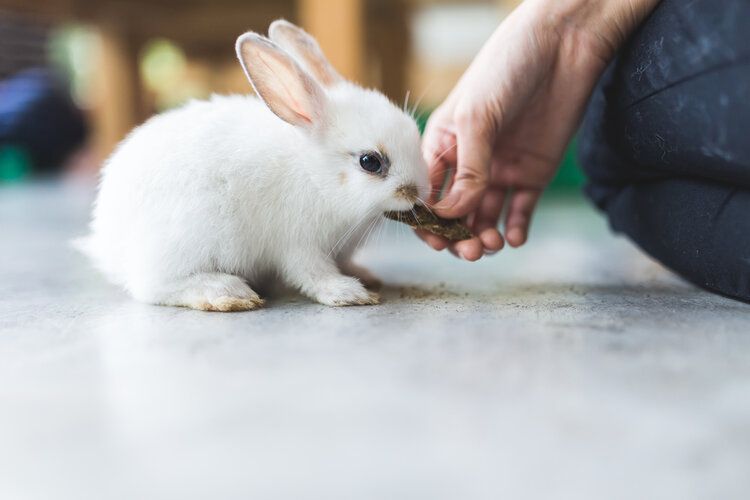
10. Destructive Behavior
Another sign to look for that could indicate fear, stress or frustration in your rabbit may be destructive behavior. Some rabbits are naturally more playful and even destructive when they explore. But if your rabbit starts to destroy their habitat for seemingly no reason or becomes destructive or aggressive when they never have been before, there is a reason for it, which could be boredom, territorial competition, stress, frustration or an underlying health issue.

Reasons That Your Rabbit May Seem Sad or Depressed
Rabbits can seem sad or depressed for several reasons, including health issues, pain, inability to express their natural behaviors, stress, loneliness, and boredom. A habitat that is too small to move around and explore can also lead to an unhappy and frustrated rabbit. Being unwell, a sudden change in environment or routine, and frightening experiences can all be sources of behavioral changes, even if they are temporary.
Once you spot signs that resemble sadness or depression in your rabbit, it’s important to observe their behavior, eating and drinking, defecation, and urination habits closely, and consult with a vet without much delay. Your veterinarian can provide you with expert guidance, rule out any underlying health issues, and help your rabbit become the happy and healthy animal that they deserve to be.


Final Thoughts
Keep an eye on your rabbit’s behavior daily to determine whether any changes are developing that need to be addressed. The sooner that you spot signs of your rabbit feeling unwell, stressed, or frightened, the easier it will be to help your beloved pet feel better and become their normal selves again. It’s always important in such circumstances to visit your veterinarian to rule out a health condition or injury.
Featured Image Credit: Mary Swift, Shutterstock
Contents
- The 10 Signs Your Rabbit Is Not Feeling Well Or Is Stressed
- 1. Lack of Appetite
- 2. Frequent Pacing
- 3. Tendency to Hide
- 4. Onset of Biting
- 5. Grooming Habits
- 6. Obvious Lethargy
- 7. Difference in Posture
- 8. Being Antisocial
- 9. Change in Poop
- 10. Destructive Behavior
- Reasons That Your Rabbit May Seem Sad or Depressed
- Final Thoughts
